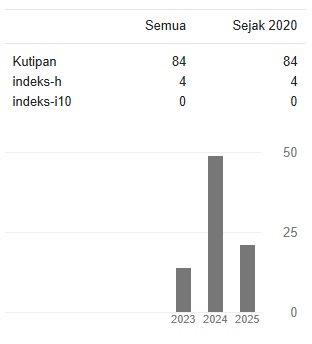Keabsahan Pemberian Wasiat Berdasarkan Standarisasi Umur (Studi Komparatif Antara Kompilasi Hukum Islam dan Hukum Islam)
The Validity of Granting a Will Based on Age Standardization (Comparative Study Between the Compilation of Islamic Law and Islamic Law)
DOI:
https://doi.org/10.36701/qiblah.v3i1.1323Keywords:
validity, will, standardization, age, KHIAbstract
This research was conducted with the aim of understanding the validity of wills based on age standardization from the perspective of the Compilation of Islamic Law and Islamic Law. Including to determine differences in the validity of wills based on age standards from the perspective of the Compilation of Islamic Law and Islamic Law. The type of research used is descriptive qualitative using normative literature and juridical study methods. As for the research results; Firstly, minor children who are not yet mature are allowed to make a will and their will is valid provided that the minor child must be of sound mind. In fact, the will of a small child has no legal basis from the Koran, except for the hadith narrated by Umar bin Khattab ra. that the will of a small child is permissible and is the word of a friend. Second, in the Compilation of Islamic Law it is very clear that a person who will make a will must be at least 21 years old, if the person doing it is not of age, in the Compilation of Islamic Law the will is invalid. Third, there is a difference between the Compilation of Islamic Law and Islamic Law, namely in determining the maturity and legal skills of the will. According to the Compilation of Islamic Law, a person who can make a will is a person who is truly an adult and has the ability to accept perfect laws. From what is seen in society, the age of 19 years is the standard for adulthood and the age of 21 years is the standard for making a will. As for Islamic law, the limits for people who make a will are based on being of age and being of sound mind.
Downloads
References
Al-Hadhramiy, Syeikh Salim bin Sumai. , Matan Safῑnatun Najah. Cet. I; Dimasqi: Maktabah al-Rᾱzi, 2011.
Al-Malibari, Zainuddin bin Abdul Aziz. Faṭhul-Mu’in bi Syarhi Quratul-‘Aini, bi Muhammadi al-Din. Beirut: Dar al-Kitab al-Ilmiyah, 1887.
Al-Mawardy, Alauddin Abu Hasan Ali bin Sulaiman. Al-Inṣaf fῑ Ma’rifati al-Rᾱjih Minal Khilaf ‘ala Mazhabi Imami Ahmad bin Hanbal, Juz 7. Cet. I; Beirut: Daar al-Kutub al-Ilmiyah, 1997.
Al-Shabuni, Muhammad Ali. Ṣhafwat al-Tafᾱsir. Libanon-Beirut: Dᾱr al-Fikr, 2011.
Al-Suyuthi, Jalaluddin Muhammad bin Ahmad al-Mahaly dan Jalaluddin Abdurrrahman bin Abi Bakar. Al-Jalâlain. Mesir: Dar al-Hadits, 2015.
Al-Thabary, Muhammad bin Zarir bin Yazid bin Katsir bin Ghalib al-Amly Abu Ja’far. Al-Bayan fî Ta’wῑl al-Qur’an. Cet. 1; t.p.: Muasasat al-Risâlat: 2000.
Arikunto, Suharsimi. Prosedur Penelitian Suatu Pendekatan Praktek. Jakarta: PT Rineka Cipta, 2006.
Attamimi, A Hamid S. Kedudukan Kompilasi Hukum Islam dalam Sistem Hukum Nasional, Suatu Tinajauan dari Sudut Teori Perundang-undangan Indonesia. Jakarta: Gema Insan i Press, 1996.
Bin Hazm, Muhammad Ali bin Ahmad bin Said. Al-Muhalla. Jakarta: Pustaka Azzam, 2007.
Bin Qadir, Samsuddin Ahmad. Nataiju al-Afkar Juz 9. Beirut: Dᾱr al-Kitab al-‘Alamiyah, 1990.
Dahlan, Abdul Aziz. Ensiklopedi Hukum Islam. Cet. I; Jakarta: Ichtiar Baru Van Hoeve, 1996.
Depdiknas. Kamus Besar Bahasa Indonesia. Jakarta: Balai Pustaka, 2002.
Fatchurrahman. Ilmu Waris. Bandung: Al-Ma’arif, 1981.
Ibn al-Mughirah Muhammad Abi Abdillah Muhammad bin Ismail ibn Ibrahim. Ṣhahih Bukhᾱri. Beirut: Dᾱr al-kutub, 2002.
Ibnu Qudᾱmah. Asyrahu al-Kabῑr, Juz 6. Beirut; Daaru Fikr, 1992.
Kementerian Agama RI. Al-Qur’an dan Terjemahnya. Bandung: CV. Diponegoro, 2008.
Rasjid, Sulaiman. Fiqh Islam ( Hukum Fiqh Islam. Bandung: Sinar Baru Algensindo, 1994.
Ridha, Rasyid. Fikih Islam. Cet. XVII; Jakarta: Al-Thahiriyah, 1999.
Rofiq, Ahmad. Hukum Islam di Indonesia. Jakarta: Raja Grafindo Persada, 1997.
Sābiq, Sayyid. Fiqh al-Sunnah, terj. Mukhlisin Adz-Dzaki, Fikih Sunah, Jilid 4. Surakarta: Insan Kamil, 2016.
Sanawiah dan Muhammad Zainul. “Batasan Kedewasaan Wasiat dan Kecakapan Hukum Pewasiat” Vol, 5 No. 1. (2018):h. 9
Subekti, R dan R.Tjitrosudibio, Kitab Undang-Undang Hukum Perdata. Jakarta: Prandnya Paramita, 1986.
Thalib, Sajuti. Hukum Kewarisan Islam di Indonesia. Jakarta: Sinar Grafika, 2017.
Umam, Dian Khairul. Fikih Mawaris. Bandung : Pustaka Setia, 1999.



 FOCUS AND SCOPE
FOCUS AND SCOPE EDITORIAL TEAM
EDITORIAL TEAM












